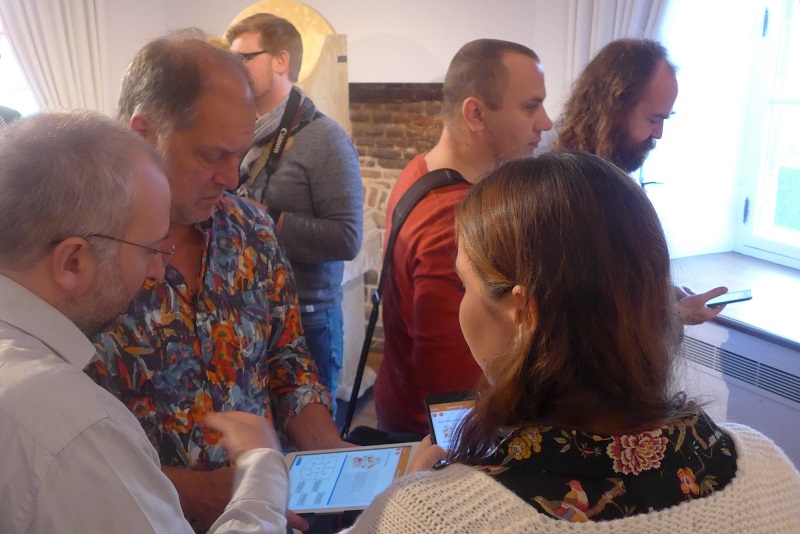Thematic week: Interpreting cultural heritage – Strengthening cohesion. The Erasmus+ project People, Places and Stories

Original language: German
Participation, communication and cooperation between different – including ethnically different – groups, equal opportunities, and feelings of insecurity have been prominent topics in recent years. Cultural heritage can play a key role in facilitating inclusion, belonging, and formation of identity. Cultural heritage refers not only to specific sites, but to culture itself. It is a broad concept encompassing cultural, natural, tangible, and intangible heritage.
Cultural heritage can be more than facts and figures
Placing integrative narrative, participation, and contemporary thought-shaping processes at the centre of interpretation helps to emphasise the unifying elements of culture and cultural heritage. Their decisive, positive role in social and European cohesion can be utilised thanks to this bridge-building approach.
Admittedly, there is a risk of reactionary groups using cultural heritage to revive nationalist narratives and maintain barriers by focusing on traditional, ethnic, and territorial elements. This view of cultural heritage as a “valuable relic from the past”, which refers purely to our cultural and historical roots, can be counteracted by engagement and interpretation which both integrates and strengthens bonds. After all, culture and cultural heritage also refer to modern customs and sets of values. Both these things are resources which people can identify and use as an expression of their continuously evolving values, convictions, knowledge, and traditions.
Competencies for professional cultural education

 Fig. 1: Course for cultural educators Image: blinc
Fig. 1: Course for cultural educators Image: blinc
So what are the practical ways of strengthening social cohesion, teaching about social sustainability, and attracting people to cultural engagement? The Erasmus+ project “People, Places and Stories” (PPS) is investigating this issue. The aim of the project is boost the abilities of people who are involved in civil society so that they can impart cultural heritage as something to be actively experienced and as a resource for sustainable development. To achieve this goal, the competencies of professional and voluntary staff who are actively involved in cultural heritage education and interpretation in cultural associations, institutions, and groups (known as “heritage communities”), will be supported and developed in a targeted manner. This will allow such organisations to improve their provision and boost the effect on participants and groups as well as on society as a whole. Partner organisations from six European countries and from various disciplines are also developing a competency framework and a continuing education course in which these competencies can be acquired.
These courses teach methods which allow planners to involve the local population in developing concepts for events and to utilise their knowledge as a valuable resource in shaping the content of cultural education provision. Storytelling will also be an important part of the project. The main aim is to emotionally connect with visitors to cultural heritage sites so as to create a relationship to the respective location or cultural object.

PPS will help cultural heritage experts and interpreters as well as policy makers to be better prepared when it comes to fostering and supporting an integrated and participative approach to cultural heritage. Adult educators gain deep understanding of the competence-oriented training and validation potential in cultural heritage settings and are better equipped to use cultural heritage as a rich learning environment for competence-oriented, location-related learning. Citizens and participants acquire personal and social competencies for successful involvement in socio-cultural processes.
For European cohesion: The FARO Convention
The project builds on numerous previous projects which already dealt with various innovative methods for interpreting cultural heritage. In addition, the project content is based on the FARO Convention (the 2005 Council of Europe Framework Convention on the Value of Cultural Heritage for Society). This defines which priorities cultural interpretation and education should pursue. These include, in particular: strengthening cultural diversity to promote social cohesion; improving living environments and quality of life; enabling democratic participation in cultural heritage.[i]
[i] Ratzenböck, V. & Wulz, E., Rahmenübereinkommen des Europarates über den Wert des Kulturerbes für die Gesellschaft. Eine Bestandsaufnahme. Vienna, 2016.
 Who is involved in the project?
Who is involved in the project?
Partner organisations from six European countries are involved in the project. Project coordinator is the Kassel district in Germany. The Blended Learning Institutions’ Cooperative (blinc) from Germany, the Federation for European Storytelling (FEST) from Belgium, Smart Revolution and the University of Salento from Italy, the Centre for Applied Archaeology from University College London in England, the PLATform Opleiding, Onderwijs en Organisatie (PLATO) from the Netherlands, as well as the Association des Centres culturels de rencontre from France, are also involved. People, Places and Stories began in November 2020 and ends in October 2022. More information is available at: https:/pps-eu.org/.
About the authors:
Martin Christian is a historian and trainer for communication and entrepreneurship and is responsible for the development of learning arrangements and content in various projects.
Dr. Maike Gauger-Lange is a historian and project manager and is responsible for managing and implementing Erasmus+ projects.
[1] Ratzenböck, V. & Wulz, E., Rahmenübereinkommen des Europarates über den Wert des Kulturerbes für die Gesellschaft. Eine Bestandsaufnahme. Vienna, 2016.


 Fig. 1: Course for cultural educators Image: blinc
Fig. 1: Course for cultural educators Image: blinc
